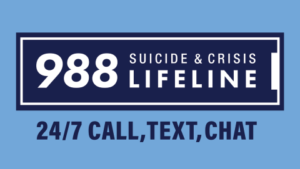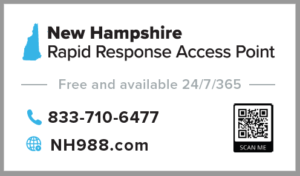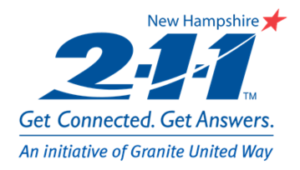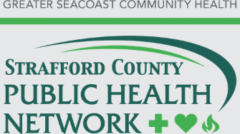If you or someone you know is experiencing a medical emergency or is threatening themselves or others, dial 9-1-1
For non-life threatening mental health crisis, dial NH Rapid Response Line at 833-710-6477 or 9-8-8




The consequences of substance misuse on our region are substantial, as is its toll on emotional, mental, physical, and economic wellbeing of individual residents. Substance Misuse Prevention is a process that works towards preventing substance misuse or limiting the development of problems associated with using substances such as alcohol, nicotine, marijuana or other drugs.
Prevention efforts may focus on an individual’s knowledge, attitudes and behaviors around the use of substances, and work to increase protective factors while decreasing risk factors, as they relate to the development of substance use disorders. These factors focus on the environments that people live, work and play in. In New Hampshire, Substance Misuse Coordinators (SMPs) work in every region of the state to promote effective substance misuse prevention policies, programs, and practices.

Substance Misuse Prevention Vocabulary
Information Dissemination: The sharing of information, tools and resources to increase knowledge and awareness of substance misuse prevention practices, as well as the problems and causes associated with substance use disorder.
Education: The process of building skills and knowledge to help prevent substance misuse, such as decision making, peer resistance, stress management, mindfulness, and interpersonal communication.
Alternatives: The process of organizing and participating in healthy and constructive activities that exclude the use of substances.
Problem Identification: The process of identifying, assessing and referring individuals at risk of, or actively misusing substances to services and programs.
Community-Based Process: Prevention efforts that focus on the health outcomes of an entire population, rather than an individual’s.
Environmental: A set of strategies that aim to change standards, codes, and attitudes towards substance misuse within a community. Examples include laws and policies that revolve around substances, like tobacco, marijuana and alcohol, etc.
Risk and Protective Factors: Characteristics that contribute to the development of a substance use disorder. These characteristics exist in individuals, relationships, communities and society. Risk factors can make problem outcomes more likely, while protective factors can help make them less likely.
Social Norms: A prevention practice that focuses on positive messaging about healthy behaviors and attitudes. It is designed to correct misconceptions that normalize substance misuse behaviors.
Ease of Access: An individual’s ability to access substances that they would otherwise not have access to. This strategy focuses on safe practices in sales, prescribing, use, storage and disposal.
Perception of Harm: A person’s perception of the risks associated with substance use is an important factor as to whether they engage in substance use itself. For example, people who perceive a higher risk of harm from substance use are less likely to use than those that perceive a lower risk of harm.
Harm Reduction: Strategies and ideas that aim to reduce problem outcomes and harms associated with substance use. This includes safer use, managed use, conditions of use, abstinence and use, itself.
Prevention Leadership Group (PLG)
Our Substance Misuse Prevention Coordinator (SMP) convenes a monthly committee of prevention experts from throughout the region called the “Prevention Leadership Workgroup”. This meeting allows members to work together to create, support and implement prevention initiatives throughout the community. This working group is open to anyone living or working in Strafford County.
The Prevention Leadership Team works to:
-
- Ensure substance misuse prevention priorities and programs are data-driven, evidence based, and culturally appropriate
- Assist with building our community’s capacity to address substance misuse
- Advance the field of prevention in New Hampshire
- Guide the implementation of the three-year strategic plan
- Support community mobilizing efforts
To join our Prevention Leadership workgroup please contact: SCPHN@goodwinch.org
Other resources:
- NH Governor’s Commission on Alcohol and other Drugs Action Plan
- Prescription Drug Drop-Box Locations
- SAMHSA’s Substance Use and Mental Disorder Prevention.
- Partnership for a Drug-Free New Hampshire
- NH Charitable Foundation
- Department of Health and Human Services’ Bureau of Drug and Alcohol Services Prevention Services
- NH Harm Reduction Services
